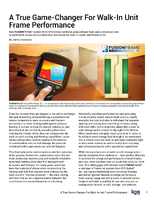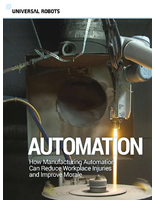Multifunction Cards deliver 3 MHz performance.
Press Release Summary:

PowerDAQ Series PD2-MF-3M/12 offers aggregate throughput rates of 3 MHz on 16 or 64 analog input channels with 12-bit resolution. Units include instrumentation amplifiers for either high- or low-level signals. Standard onboard FIFO is 16 k samples with options for FIFO buffers of 32 or 64 k samples. Cards feature dual 12-bit analog outputs each running at 200 k samples/sec, 16 digital inputs, 16 digital outputs, and 3 counter/timers. Support software is included.
Original Press Release:
3 for 1 - UEI Upgrades 1-MHz Multifunction Cards to 3 MHz at no Additional Cost
Canton, MA (August 17, 2004)-Taking advantage of improvements in the price/performance of analog ICs, United Electronic Industries is announcing the PowerDAQ PD2-MF-3M/12 families of multifunction cards. Offering aggregate throughput rates of 3 MHz on either 16 or 64 analog input channels with 12-bit resolution, they replace UEI's 1-MHz families of 12-bit multifunction cards-at the same price. Users indeed get 3-MHz performance for the price of 1 MHz.
These 3-MHz cards are available for the PCI bus (PD2 family). The analog front end provides either 16 or 64 multiplexed inputs that feed a 3-MHz, 12-bit A/D converter. They come with instrumentation amplifiers for either high-level signals (G = 1, 2, 4 or 8) or low-level signals (G = 1, 10, 100 or 1000). The standard onboard FIFO is 16k samples (compared to 1k samples on the previous 1-MHz boards) with options for FIFO buffers of 32k or 64k samples.
These multifunction boards do far more than just collect analog inputs. Other features include dual 12-bit analog outputs each running at 200k samples/sec, 16 digital inputs, 16 digital outputs and three user counter/timers. Because the cards all come with their own DSP that runs a dedicated kernel, all of these subsystems-analog input, analog output, digital inputs, digital outputs and counter/timers-can run simultaneously without any concern for what load is on the host PC's CPU.
UEI is particularly proud of the breadth and depth of the support software it supplies with each card at no charge. The PowerDAQ Software Suite includes drivers for all popular operating systems including Windows NT/2000/XP, Linux, realtime Linux patches including those from RTAI and FSM Labs, and QNX; PharLap ETS drivers will be shipping shortly. To aid in application development, the PowerDAQ API supports programs written in C, C++, Visual Basic, Delphi and Kylix. Those users who wish to create their applications in test-development environments will find extensive support for Lab VIEW (under both Windows and Linux), Lab VIEW Real-Time, Agilent VEE, DASYLab and TestPoint. In addition, the drivers support The Math Works' MATLAB Data-Acquisition Toolbox as well as the xPC realtime platform. Finally, the free ProfessorDAQ utility is an Excel plug-in that allows full control of all I/O subsystems from within that popular spreadsheet.
Price and Availability
The various models in this new family of cards include:
PD2-MF-16-3M/12H 16-channel 3-MHz PCI board, gains for high-level signals $1450
PD2-MF-16-3M/12L 16-channel 3-MHz PCI board, gains for low-level signals $1450
PD2-MF-64-3M/12H 64-channel 3-MHz PCI board, gains for high-level signals $1650
PD2-MF-64-3M/12L 64-channel 3-MHz PCI board, gains for low-level signals $1650
PD-32KFIFO Upgrade 4k-sample FIFO buffer to 32k samples $500
PD-64KFIFO Upgrade 4k-sample FIFO buffer to 64k samples $800
The boards will be available for initial customer shipments on September 1, 2004.
For more information about these or about any other UEI hardware and software products, users can go to www.ueidaq.com or call 781-821-2890.
About United Electronic Industries, Inc
Known as "The High-Performance Alternative," UEI is a supplier of leading-edge PowerDAQ PCI- and PXI-based data acquisition cards, the PowerDNA Ethernet-based distributed data-acquisition and automation system, signal-conditioning accessories and software. In particular, it has emerged as a market leader in the field of hard realtime data acquisition on PCs through its support of realtime Linux implementations and commercial RTOSs. A proprietary protocol on the PowerDNA Cube gives Ethernet-based I/O systems true realtime performance, but the system also runs with conventional Ethernet protocols, as well. Among the firm's major markets are sophisticated production test systems, process monitoring and control as well as research/development.




